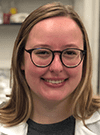ACGT Program Trainees
2023 Advocates

Anna Capria is a current Human Genetics and Genomic Data Analytics MS student at Keck Graduate Institute. She is an alumnus of the Rochester Institute of Technology with a Bachelor’s in Biomedical Science. Finishing up her capstone project at KGI with Boston Children’s Hospital, she analyzes phenotypic information from the Children’s Rare Disease Cohorts initiative. Driven by making sense of data, this project and training allow Anna to pull meaningful insights. In her free time, she is active in campus life, including serving as the professional development chair in student government and running the data science club. Anna has always been interested in human genetics and rare disease, which is why she actively participates in her Students for Rare NORD chapter. Anna is driven by improving the people around her, which further motivates her excitement for this program. In the future, Anna hopes to be a leader in advocating and understanding the ethical issues surrounding genetics so that all people have informed access to their genetic information.

Hubert Chen is a current undergraduate student at Vanderbilt University working towards completing majors in Medicine, Health and Society, and Computer Science. He has several research interests and, in the past, has done research on Duchenne Muscular Dystrophy (DMD), a genetic muscle-wasting disease, to identify the types of mutations that would frequently cause it to occur and the relationship between DMD and cancer. He has also done research on the PD-1/PD-L1 protein pathway to try and identify several small molecules that could interfere in this pathway that cancer cells take advantage of to avoid the immune system. In the future, he would like to continue extending his work on these two research topics. He also has deep interests in advocating for genetics given his research experience and is most interested in increasing the amount of genetic testing for cancer patients and newborns and improving access to equal quality genetic care for all. He feels privileged to be a part of this program, especially as an undergraduate and hopes to learn a lot from the experienced people in it.

Richard Coca is a Master’s student at the Stanford School of Medicine, which he began after completing a B.S. in Human Biology at Stanford. At Stanford, Richard is affiliated with the Center for Undiagnosed Disease and Stanford’s Genomics Research to Elucidate the Genetics of Rare disease (GREGoR) site. Regarding policy and advocacy, Richard is interested in the increased funding for rare diseases, regulation of genetic data, and frameworks around health equity.

Ricardo Harripaul, Ph.D., has been a postdoctoral fellow at Massachusetts General Hospital, The Broad Institute of MIT and Harvard and Harvard Medical School since 2021. He received his Ph.D. from the University of Toronto in 2021, where he identified rare recessive variants associated with autism spectrum disorder and Intellectual Disability. Now he is combining his rare variants analysis with functional genomics to determine the consequences of mutations and how they relate to phenotypes to help improve therapies. He uses a combination of CRISPR modified cell lines and functional animal models. The lack of diverse models to study impedes the translation of research findings to clinic. Ricardo’s interest in policy and advocacy stems from the disparity in genomic research not only in the samples used but also the accessibility to different groups. It is important that funding agencies increase diversity in research and make the findings more relevant to marginalized populations to improve health and give the fruits of scientific research to everyone domestically and abroad.

Christy LaFlamme (she/her), M.S., is a third-year Ph.D. candidate at the St. Jude Children’s Research Hospital Graduate School of Biomedical Sciences in Memphis, TN. Her current research focuses on the neurogenetics and epigenetics of severe pediatric neurological disorders. Christy recognizes how marginalized communities are underrepresented in genomics research while simultaneously being impacted by the translation of genetic information into society. Her interests in policy and advocacy are driven by her desire to influence policies that address systemic inequities in genomics research. These include advocating for increased funding to support diversity and representation in biomedicine, supporting gender-affirming genetics care, and petitioning against the misuse of genetic information.

Jasmine Lewis is a third year Ph.D. student in the Biological Psychology program at Virginia Polytechnic Institute and State University. Before graduate school, she was an advocate for survivors of domestic and sexual violence. One of her long-term career goals is to: 1) develop and refine community-based interventions; and 2) educate the community on possible protective factors that could help offset the negative effects of chronic traumatic stress. In order to achieve this long-term goal, her program of research focuses on the biological and psychological sequelae of childhood trauma. Her current policy interest is improving equitable access to genomic research for underserved communities especially those that have experienced trauma.

Nandana Rao, Ph.D., M.S., is an ORISE postdoctoral fellow at the Centers for Disease Control and Prevention Office of Genomics and Precision Public Health. Nandana received an M.S. in genetic epidemiology and a Ph.D. in public health genetics from the University of Washington, Seattle. Her dissertation focused on implementation and health equity considerations for population genetic screening of adults for hereditary cancers and heart disease. Nandana’s policy and advocacy interests center around improving equitable access to genetic services for all individuals.

Grace Tietz is a Ph.D. student in the Genetics & Genomics Program at Baylor College of Medicine. Prior to starting her graduate studies, she worked at the National Institute of Allergy and Infectious Diseases where she facilitated data sharing activities in the context of the COVID-19 pandemic and obtained her B.S. at the University of Maryland College Park. Her current research aims to improve transferability of genetic testing across ancestries using population genetics approaches. Her policy interests are centered around the importance of improving diversity in genetics, both in the workforce, and in the cohorts that are studied. She additionally has interests in data diplomacy, sharing, and governance in genetics.

Leonard Wang is an M.D./M.P.H. student at the University of Texas Medical Branch. He received his B.S. in Biomedical Sciences from the University of Houston, where he conducted environmental conservation research in the Galápagos Islands. At the University of Texas Medical Branch, Leonard works as the Health Policy Research Coordinator for the Center for Violence Prevention. He is also a Senior Fellow for the Albert Schweitzer Fellowship, where he founded a vaping harm reduction program to educate middle and high school students on the science of addiction and the health impacts of vaping. Leonard is passionate about using narrative medicine and a structural violence lens to promote health equity and advocate for patients. His overarching goal is to improve equitable access to genetic care and develop human-centered solutions for sustainable change in our healthcare system.
2022 Advocates

Yusra Aziz is a current genetic counseling student at the University of Texas MD Anderson Graduate School. She has a B.S. in Genetics from Texas A&M University, and worked as a student assistant in the Office for Diversity and volunteered for the Crisis Helpline. She sees being an advocate for marginalized patient communities as a responsibility and is passionate about increasing equity in genetic testing access and genomic research. Her current research is exploring the need for racial and ethnic health disparity curriculum in genetic counseling programs.

Rene Begay, M.S., is (Diné/Navajo) from Arizona. She is an Indigenous geneticist and public health researcher. She obtained her B.S. in Biology from the University of Arizona and a Master’s in Clinical Science from the University of Colorado Anschutz Medical Campus. Currently, she works as a Professional Research Assistant at the Centers for American Indian and Alaska Native Health at the University of Colorado School of Public Health while studying as an online Master’s of Public Health and Bloomberg Scholar with the Johns Hopkins School of Public Health, focusing on the topic of food systems and obesity. Her advocacy interests include ensuring that Indigenous people’s voices are involved in genomics research studies at the local to national level. Furthermore, Indigenous communities are equitably engaged, consulted, and ultimately leaders in genomic studies that seek to benefit their people. Her current policy interest is to help the Navajo Nation develop a genetics research policy that will enable her community to participate or not participate in genomics research in the future.

Grace Calfee is a second-year health sciences and nonprofit administration student at Cleveland State University who would like to become a genetic counselor. In the future, she would like to work on research for genetic counseling or genetic risk factors for cancers without known causes. She enjoys advocating for people with disabilities and working with them, and hopes to continue to do so in the future. Preventing genetic discrimination and regulating direct-to-consumer genetic testing are her other advocacy goals. She feels privileged to be a part of the ACGT program, especially as the only undergraduate student.

Christina Del Greco is a Ph.D. candidate at the University of Michigan Department of Human Genetics, which she began after completing a B.S. in Biological Sciences from the University of Notre Dame. At the University of Michigan, Christina studies the proteins (called aminoacyl-tRNA synthetases, or ARSs) that are responsible for preparing amino acids for cells to make new proteins. Specifically, Christina studies the role of ARSs in the mitochondria. If mutations occur that cause these ARSs to lose their function, then the mitochondria are unable to make the proteins required for generating energy for cells, which can lead to disease. Regarding policy and advocacy, Christina is interested in the regulation of genetic data, specifically but not limited to direct-to-consumer genetic testing, as well as germline gene editing policies.

Kimberlyn Ellis is a Ph.D. student in the Training Program in Human Genetics at Vanderbilt University Medical Center. Her research explores the interplay of genetic determinants, behavioral determinants, and social determinants of health with an emphasis on health equity. With this work, Kimberlyn hopes to elucidate the ways in which social and environmental factors “get under the skin” and influence disease onset and outcomes in marginalized communities. Prior to being a Ph.D. student, she received a B.S. in Biology from Spelman College in 2019 and completed the NIH Postbaccalaureate Research Education Program at Brown University in 2020. In 2022, Kimberlyn became a Christine Mirzayan Science and Technology Policy Fellow at The National Academies of Sciences, Medicine, and Engineering. Kimberlyn’s policy and advocacy interests include improving social determinants of health for underserved communities, reducing health disparities, increasing funding for interdisciplinary research between basic science and social science fields, and promoting social good.

Azra Frkatovic is an early-stage researcher at Genos, a company which specializes in high-throughput glycome analysis, while also pursuing a Ph.D. at the University of Zagreb, Croatia. Her Ph.D. project is focused on investigating the genes involved in antibody glycosylation, a process which is highly important for the regulation of our immune system. Having the experience of working in the field of genomics, Azra decided to join the ACGT program to learn how to address the lack of support for genomic research and genetic data protection back in her home country. She also sees the ACGT program as a great opportunity to gain skills and get familiar with the ways to bridge the gap between scientific discovery and the policy-making process.

Sofia Horan is a second-year genetic counseling student at Sarah Lawrence College. She received a B.S. in Cell and Molecular Biology from Northeastern University in 2020. For her master’s thesis she researched the impact restrictive abortion legislation has on genetic counseling practice. She has particular interests in how genetics policies directly affect patient care, like the Genetic Information Nondiscrimination Act (GINA) protections and newborn screening policies, and how to utilize genetics policies to expand access to genetic testing.

Kristen Lancaster, M.D., is currently a clinical fellow in Medical Genetics and Genomics at the University of North Carolina at Chapel Hill. She received a B.A. in Biology and Music Performance from Franklin and Marshall College and an M.D. from the University of Maryland School of Medicine. She is a board-certified pediatrician after completing a residency and chief residency in pediatrics at the University of Texas Southwestern from 2017 to 2021. Kristen currently serves as the Section on Pediatric Trainees Liaison to the American Academy of Pediatrics Council on Genetics. As a fellow, her clinical research focuses on the natural medical history and quality of life of children with STAC3 disorder (also known as Native American Myopathy), which is a rare genetic disease characterized by life-long musculoskeletal weakness. In addition to practicing clinical genetics, Kristen has early career interests in medical education and advocacy, specifically related to improving equitable access to genetics care for all individuals.

John Morris, Ph.D., has been a Postdoctoral Fellow at the New York Genome Center and New York University since 2019. He received his Ph.D. in Human Genetics from McGill University in 2018, where he identified novel genetic determinants of aging-related diseases, such as osteoporosis, using population-scale genetic data. Now, he is combining cutting-edge CRISPR genome engineering methods and single-cell sequencing to further understand the genetic determinants of common diseases, through identifying their causal genes and gene networks. One great thing about these experimental methods is that they are population and disease agnostic, meaning researchers can apply them to study data generated from any population to identify novel disease genes and networks. Agnostic tools are especially important given the lack of genetic data generated from diverse populations, as it is well-known that almost 90% of genetic data comes from individuals with European ancestries. John’s interest in policy and advocacy stems from this disparity in genomics research, and how funding agencies like the NIH should support programs that increase diversity in genomic studies domestically and abroad.

Kenny Westerman, Ph.D., is a research fellow at Massachusetts General Hospital and Harvard Medical School with a research interest in precision nutrition for the prevention of metabolic diseases such as diabetes. Kenny received his Ph.D. in Biochemical and Molecular Nutrition from Tufts University, with a dissertation focused on predicting cardiovascular disease risk by integrating molecular quantities and dietary data. His current work uses tools from data science and genetics to understand why people respond differently to changes in diet and other lifestyle factors. In the policy space, he is interested in the regulation of direct-to-consumer genetic tests that use this type of research to develop personalized lifestyle recommendations.
